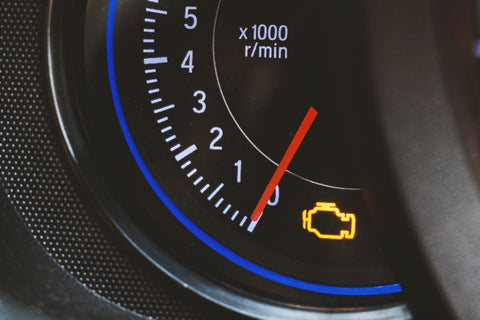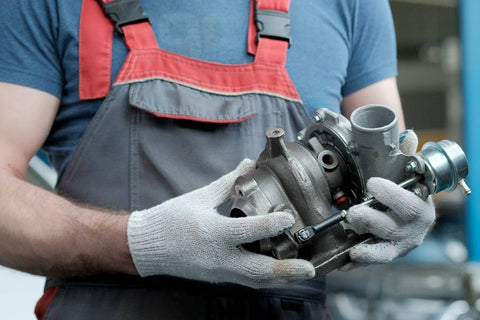Ever had a discussion about sports cars? If you did, you must have heard of the term ‘Turbochargers.’ Well, their use isn’t limited to sports/race cars anymore, and they are also found in large diesel engines these days. They are an important component, and a turbo failure can cause problems. But what happens when the turbo goes on a diesel?
In this article, we will discuss the signs of a turbocharger failure and the reasons why they fail. We will also provide some preventive measures that will help you take better care of your turbocharger.
Without any further ado, let’s talk about the signs of a bad turbo on a diesel car.
What Happens When the Turbo Goes on a Diesel?
Decreased power and acceleration
You don’t have to be an expert to know turbochargers can provide extra power to the engine. However, the turbocharger won’t push enough air into the engine when it starts to fail, and it won’t generate the same power output level as before.
You will likely notice the difference if you have driven your car with a healthy turbo. So, if the acceleration becomes sluggish and you don’t feel the turbo kick in anymore, it’s time to contact a specialist.
Increased smoke emissions
Turbochargers can develop cracks with time, which can lead to oil leakage. If it happens, the oil will burn, as the exhaust system is hot, and you will notice blue or bluish-gray smoke. The smoke can also be black or white if the turbocharger breaks down, and the emissions will be visibly different from that of a healthy truck/car.
Engine overheating
A faulty turbocharger can lead to engine overheating, as it won’t produce enough air pressure to cool down the engine. If overlooked for a period, this can damage the engine, and you would have to pay higher repair costs.
Therefore, if your engine is overheating because of the turbo malfunctioning or any other reason, quickly contact your mechanic or explore our supply of new and used turbochargers for sale, where you can find suitable replacements or upgrades for your diesel engine.
Check engine light
Unfortunately, there isn’t a turbocharger failure warning light on the dashboard of a vehicle, but most modern vehicles have a check engine light/engine management light. The check engine light can illuminate for various reasons, and issue in the engine performance is one of them.
You should contact a specialist in such a case, especially if you notice other signs of turbo failure. You can prevent further engine damage by getting it checked and fixed.

Source: shutterstock.com / Photo Contributor: Mai_adjustment
Strange engine noises
Healthy turbocharges can also give out noise, especially under heavy acceleration, but if it produces a strange noise, you should get it checked. You may notice a hissing, whining, or whistling sound if there’s a problem with the turbo. Moreover, if the sound is getting worse, you should get it checked by a mechanic straight away.
High oil consumption
If you notice that your engine is consuming more oil than it normally does, it can be a sign of a turbo failure. You should investigate the issue in such a case and check if the turbo is healthy or not to prevent total failure.
These are the common signs of turbo failure. If you notice any of these signs, you should take quick action to prevent further damage. Now that you know what happens when the turbo goes on a diesel, you might be wondering why turbochargers fail.
While there can be several reasons for a turbocharger failure, some are more common than others. We will discuss them in the following section.

Source: shutterstock.com / Photo Contributor: Palitsyn Evgenia
Why Do Turbochargers Fail?
Age-related wear
Each of your car’s components has a certain life expectancy, depending on its durability. When the turbocharger has run its course, age and wear can cause a failure. Generally, you can expect a healthy turbocharger to last 150,000 miles or 240,000 kilometers.
Over-speeding
Every mechanical component has its manufacturing limit, and the same is the case with turbochargers. Over-speeding can push it beyond its safe operating limit, which can result in damage or even failure. This issue is more common in trucks and semi-trucks, but cars with a turbocharger can also have similar issues.
Thus, make sure to drive responsibly to maintain good turbo health.
Poor maintenance
Regular maintenance can extend the turbocharger’s life or at least help it run its full course. The maintenance part includes regular filter and oil changes, which are sometimes overlooked.
Poor maintenance can lead to a turbocharger failure.
Overheating
Overheating is another common reason for turbocharger failures. The turbocharger is prone to overheating when it’s exposed to extreme heat. Extended periods of driving, especially in hot climate conditions or at high speed when the vehicle isn’t well-ventilated, can cause the turbo to overheat.
Overheating can produce cracks or damage the turbocharger, as it can expand. To avoid such issues, you must keep the cooling system in good condition.

Source: shutterstock.com / Photo Contributor: Nixx Photography
Oil contamination
Oil ensures lubrication and prevents premature wear in the turbocharger. So, oil contamination is a turbocharger’s biggest enemy, and it’s a common cause of turbo failure.
High carbon buildup in the engine can be responsible for oil contamination; however, several other reasons, such as poor maintenance and metal shavings, can also be responsible.
Restricted oil feed
A turbocharger needs fresh engine oil to function efficiently. But if any of the oil feed tubes is blocked, bent, or damaged, it can lead to a turbo failure. Insufficient engine oil or a blocked engine oil filter can also cause problems.
These issues usually cause the turbo to overheat, and it often fails quickly in such cases.
Other possible reasons
A manufacturer’s fault is rarely the reason for a damaged or malfunctioning turbo; however, it’s a possibility. A blocked catalytic converter can also be the reason.
Moreover, there can be many unknown reasons for turbo failure. But you should get the problem fixed as soon as possible.
Overall, these are the most common reasons why turbochargers fail. The parts that often get damaged are the wastegate, bearings, oil seals, and the turbo compressor wheel. Each part can get damaged for multiple reasons, but regular maintenance can help you keep the turbo in good shape.
Let’s discuss how you can avoid failure and extend the turbocharger’s life.
How to Avoid a Turbo Failure
Avoid hard accelerations in a cold car
People often park cars overnight and sometimes for even longer periods. In such cases, the engine oil accumulates at the bottom of the engine. When you turn on the engine, the oil takes some time to circulate around the engine and reach the turbocharger. This is why you should avoid hard accelerations when the car is cold.
Don’t shut down a hot engine
If you drive your car for 20+ minutes, you should give your turbo some time to cool down before turning off the engine. If you keep the engine running for a minute or two after parking the car, fresh oil will circulate around the turbo, allowing it to cool down.
Avoid prolonged engine idling
You should also avoid prolonged engine idling, as it can create a vacuum with the turbine, which can lead to damage. While it won’t harm the turbo if you stop at a red light, it can lead to issues if you leave the car idle for several minutes before heading off.
Well, these are the steps you can take to keep the turbo in good condition and prevent premature breakdown. Your car will thank you for these small habit changes and preventive measures. These habit changes can do wonders in the long run.
Conclusion
What happens when the turbo goes on a diesel? You will likely notice the signs we have mentioned in case of a turbocharger failure.
When you notice these signs, it’s time to replace the turbocharger. You shouldn’t delay this as a failing turbocharger can damage the engine, which is the last thing you would want.
If you aren’t sure if it’s time to replace the turbocharger, it’s better to contact an expert. A mechanic will help you make the right decision.
You should try the preventive measures we have covered in this article to prolong the lifespan of the turbocharger and avoid failures. Taking care of the maintenance part can save you a lot of money in the long run.



